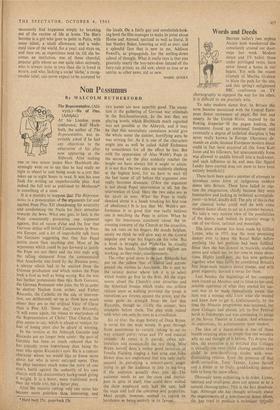Non Po ssumus
By MALCOLM RUTHERFORD The Representative. (Ald- wych.)—Six of One. (Adelphi.) It is a mistake to suppose that The Represen- tative is a presentation of the arguments for and against Pope Pius XII abandoning his neutrality and condemning the Nazis for their atrocities towards the Jews. What one gets, in fact, is the Pope consistently presenting one argument against, that of raison d'etat and the fear that German defeat will install Communism in West- ern Europe, and a lot of improbable talk from the Germans suggesting that they fear Papal action more than anything else. Most of the arguments which could be put forward to justify the Pope are not there and the text ends witt the telling statement from the commentato? that Auschwitz was freed by the Russian army, a phrase which had to be omitted from the German production and which makes the Pope look a fool as well as being wrong. But the text has further pretensions than this. Both Gerstein, the German Protestant who joins the SS in order to destroy Nazism from within, and Father Riccardo, the Catholic on the side of interven- tion, are deliberately set up to show how much closer they are to the original Vicar of Christ than is Pius XII. 'Some day,' says Riccardo, 'it will come again, the return to martyrdom of the Representative of Christ.' That Church, the play seems to say, which is afraid to venture for fear of losing must also be afraid of winning.
In the version at the Aldwych Gerstein and Riccardo are no longer twin saints: the part of Gerstein has been so much reduced that he has scarcely more importance than being the man who opens Riccardo's eyes. He is a curious character whom we would like to know more about but who is never enlarged upon. Thus the play becomes much more the story of one man's battle against the authority of his own church with the documentary background giving it weight. It is a lesser, more traditional work than the whole text, but a better play.
After the massive cutting only one scene has become more pointless than interesting, and *Hard back 25s.; paperback 15s. two scenes are now superbly good. The excep- tion is the gathering of German war criminals in the Reichsuniversitat. In the text they are playing bowls, which Hochhuth much regretted was not possible at the Aldwych, and it may be that this naturalistic casualness would give the whole scene the sinister, horrifying aura he was striving for. As it is one of the characters might just as well be called Adolf Eichmann by coincidence for all the effect he has. But with the appearance of Alan Webb's Pope in the second act the play suddenly reaches the height we have always felt it ought to attain. It is not that the two sides are suddenly clashing at the highest level, for we have to wait till the last scene of all before the argument ever really becomes dramatic. (Then the argument is not about Papal intervention at all, but the intervention of God. Here the two sides are as far apart as ever. What the Pope is really shocked about is a Jesuit breaking his first vow of obedience.) It is just that Mr. Webb's per- formance is so good that one really believes one is watching the Pope in action. When he signs his innocuous statement about the in- creasing concern of the Church at the atrocities, the ink runs on his fingers. He stands helpless; surely we think he will give way to the natural impulse and wipe his fingers on his robe. But • a bowl is brought and Pilate-like he ritually washes his hands. Symbolism and realism are working, as they must, simultaneously.
The other good scene is the last. Riccardo has put on the yellow Star of David and accom- panied the victims to Auschwitz. He is met by the satanic doctor whose job it is t,o select which bodies go first to the fires. All the argu- ments about the Church's own atrocities and the historical ironies which make one million victims seem as nothing provided the tyrant is victorious are thrown against the priest, and the scene gains its strength from the fact that Riccardo, though so visibly the winner, here crumples before them. The play ends indeed with what can only be seen as a crucifixion.
Six of One, the stage history of Dora Bryan, is revue for the wide screen: It goes through from pantomime to variety, taking in on its way concert party, revue and TV and musical comedy. At times it is parody, often sub- imitation and occasionally the real thing. Miss Bryan herself does a rather good imitation of Fenella Fielding singing a bad song and John Hewer does not understand that you only really succeed in parodying a concert-party singer trying to get the audience to join in his song if the audience actually does join in. The audience needs to see the corn and partici- pate in spite of itself. One could have wished the show employed only half the cast, half the stage and half the costumes and properties. Mast people, however, seemed to, regard its lavishness as being' entirely in its favour,










































 Previous page
Previous page